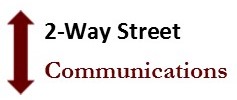Communicating with the media is as easy as 1...2...3....
If I had a dollar for the number of times I have had said to me, “I just don’t see how you can do media interviews. I would be terrified!”
Consider the media the “eyes and ears” of the general public. If there is a story to be told, it’s the media’s job to find it. Having been a reporter, I understand the mindset of “find the story; get the story.” Granted, it helps to be a little bit of an extrovert when working with both broadcast and print media, but there are also some basic rules with answering media inquiries.
1. Timeliness is paramount! The excuse, "We are too busy," "We are so understaffed," "The boss hasn't given me an answer," etc., is unacceptable. Even if the response is, "I am so sorry. Send me your information, and I will get it to the right people," - at least it's something! Being ignored sends the message that the reporter and the questions are not important.
2. Share what you can. Obviously, you can't share information you don't have; but you can be open and say that you will be happy to provide any pertinent information as soon as it is received. This shows a collaborative desire instead of the the all negative, “No Comment.” It’s OK to control the dissemination of information, and providing SOME information is better than giving the media no information at all.
3. Make the media your friend. The media really aren't the enemy unless you have something to hide or you and/or your organization already have a bad reputation with them. REMEMBER, you have the information, and you control the dissemination of it. So if you play nice, they will, too!
FOOD FOR THOUGHT:
If the media are calling, it could be for several reasons. It may be a general inquiry; it could be involving a news tip; it’s possibly a follow-up to a reported complaint. Whatever the reason, communicating promptly and honestly with the media means that you have the opportunity to share your side of the story, answer their questions to your satisfaction, and diffuse any potential problems. Having the upper hand ensures that the next time an issue arises, there is less possibility of negative publicity being broadcast on traditional and social media. That’s successful communication!

